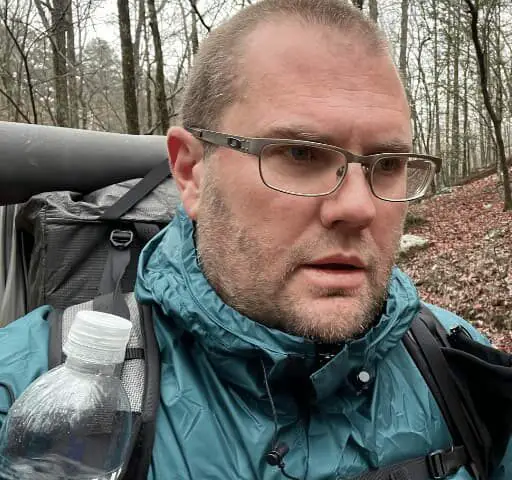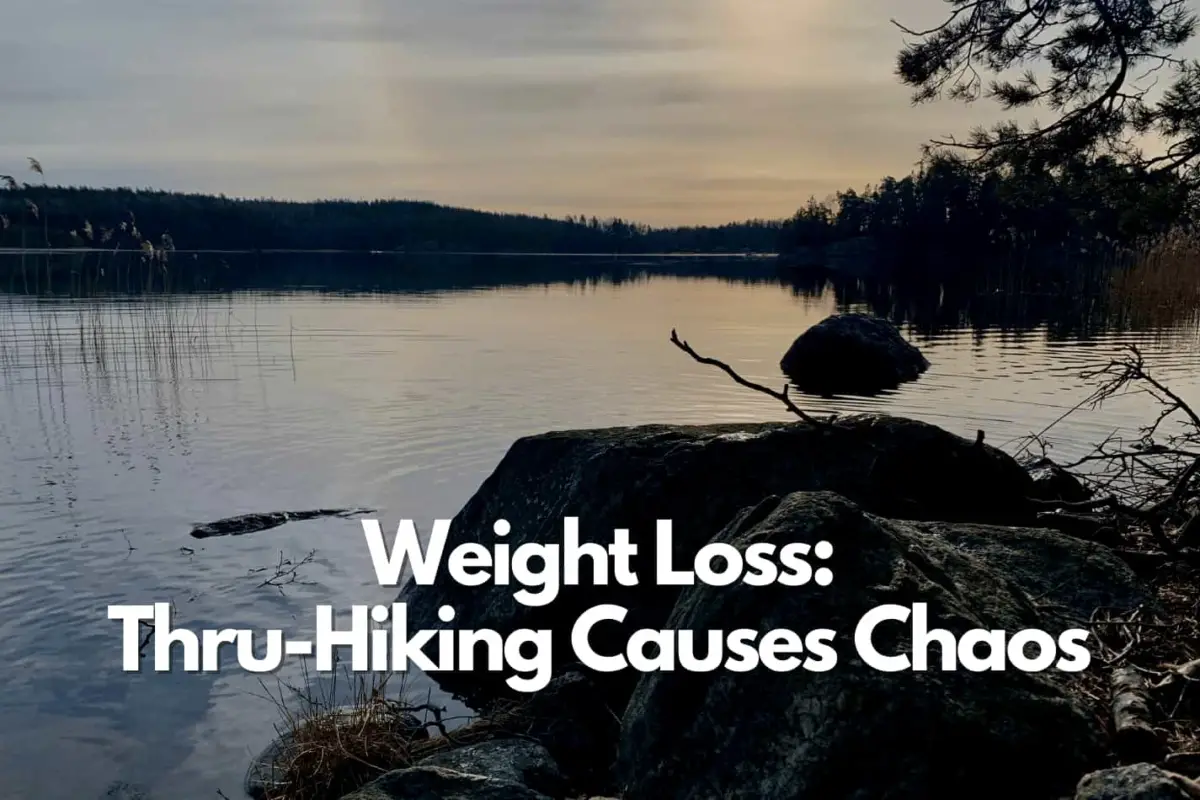When you decide to take a long-distance hike, many may be happy to lose a few, but issues can occur. Thru-hike weight loss is a genuine concern for many who start lean and mean, but it can also impact the more heavy set in ways they never expect.
Thru-hikers burn crazy calories, some quickly reaching those pinnacle Olympic swimmer levels at over 10,000 a day, leading to drastic weight loss for the average hiker.
This puts a tremendous strain on your body and forces it to convert body fat stores for fuel at a rate it has, for most people, never had to do before.
While this means that someone with some extra weight can lose weight through thru-hiking, it establishes poor dietary habits and reinforces them over months of pushing hard.
This can cause long-standing mental, emotional, and even physical issues for some long after the thru-hike is finished.
Some people find that they love the adoration the weight loss and body composition changes provide, especially if they share heavily on social media or platforms like YouTube along the way this makes them feel.
They like the attention they get from others for being so fit and healthy and begin to obsess over their own physical appearance. After the trail, though, this can lead to dangerous eating disorders such as anorexia or bulimia and compulsive exercising.
For others, the hiking weight loss is too much strain on their body, and recovery comes slowly. They find that they are lost or are losing muscle mass along with the fat and their bodies begin to perform poorly.
Let’s talk through how this happens why you lose so much weight and more about its impact.
Why Does So Much Weight Loss Happen?
Much of this extreme weight loss is simply CICO, calories in calories out. For the average thru-hiker, it is nearly impossible to eat your caloric needs in a day, this leads to heavy deficits and loss.
This comes from many factors, not just food eaten but total exercise and building strength and those well-known hiker hunger issues and hikers’ trail legs.
Hours of Physical Exertion
On a thru-hike, you will be hiking for sometimes ten or more hours a day. This is a ton of exercise, more than many normal people get in a week or maybe even a month.
You are using your leg muscles and core on a consistent basis to move yourself and your backpack up and down steep grades, over obstacles, and through all types of weather conditions.
Limited Food Intake
When putting in the massive miles per day there is less idle time sitting and eating which leads to choosing simpler foods you can eat on the move, which can lead to faster-than-wanted weight loss.
Pair this with what many would term, junk foods, which are not very “nutritional” overall and you have all the keys to health issues.
Calories Over Food Quality
Trying to manage as many calories in a day as possible can be hard when moving non-stop, then you mix in the idea that thru-hikers tend to overindulge when they do have time to eat, and it can lead to some bad decisions.
This means you are often eating high-calorie, processed foods that offer little to no real nutrition to satiate hunger and get those numbers up.
Poor Macronutrient Balance in Meals
These quick-to-eat foods aren’t typically the most nutritious nor do they have a good balance of macronutrients. Thru-hikers often end up eating far more carbs and fats and miss vital proteins that are used for repair.
This can be fine in moderation, but when you are eating 3000 plus calories of just carbohydrates it isn’t going to help you long term, finding a better mix with a solid amount of protein is vital to long-term success for your body alone.
Weight Loss
Due to food calories mattering more than nutritional content, you experience problems where you are losing weight but also losing muscle at the same time and this just gets worse the longer and harder you push to make miles.
If you are losing weight it is expected but what you need is fat loss alone and not lose muscle mass. Many believe they are gaining muscle mass when it is more the body being stripped of fat showing off the muscle you already had.
Building Strength
You will be losing weight, you can’t eat that volume a day, especially when traveling by foot tens of miles. But if you are eating good quality protein, you will be building up muscle and strength, helping your thru-hike immensely.
Even if you aren’t growing new muscle, you are pressing your existing muscle to work harder and develop longer-lasting strength and endurance, which is a huge calorie expenditure.
Muscles are constantly contracting and relaxing on a thru-hike. Walking all day uses different muscles than, say, running.
This means your body never really gets a chance to fully relax and repair itself, it is in a state of tension more often than not.
Impacts Of Massive Weight Loss On a Thru-Hiker
There are longer issues that can even carry off the trail that impact thru-hikers who have lost a lot of weight on their thru-hike.
Things like mental, emotional, and physical stress can all be amplified by weight loss.
Mental Wellbeing
Many people face challenges on their own just re-adapting to society and all the things that come with it after thru-hiking.
This can be only further complicated by any weight loss, often causing feelings of anxiety or depression as your body chemistry has changed.
Your emotional state is also going to change, you might find yourself more irritable or on edge due to the drastic change in lifestyle and all that goes along with it.
Emotional Wellbeing
Hikers often find themselves in what is known as the “post-hike blues” where they are struggling to find the same joy in life they did on the trail.
This can be from a loss of routine, community, or general malaise from not having a thru-hike to plan and look forward to.
This is also why many thru-hikers find themselves again starting to look for the next trail they can jump to trying to get those same emotional hits they got from their thru-hike.
Physical Health Impacts
There are loads of issues with your physical body after a thru-hike. You get to find out whether all the care you paid to handle it will pay off or not.
Joint Issues
Many leg issues can come from a thru-hike, especially knees, legs, and feet as they are constantly in use and put under a lot of strain.
Losing weight can add to this as there is less padding and support for these areas, meaning every single misstep is felt more and can cause more damage.
Some of these may fix themselves with some time off the trail but be ready to help them and if there is any pain go visit the doctor for an actual checkup.
Weight Fluctuations
Many have a hard time readjusting their hunger to match their real needs once they leave the trail and overeating leads to weight gain and all the issues that come with it.
This can be a hard thing to manage and usually, people who have gone thru extensive weight loss need help to learn how to eat again and what foods are best for their body type and activity level.
Weight regain is one of the biggest issues facing thru-hikers post-trail and can lead to all sorts of health problems if not managed correctly.
Thru-hiking is an amazing experience that will change your life but it is important to be aware of the issues that can arise from such a drastic change to your body and overall health.
Hormone Imbalances
Losing a lot of weight, especially in a short period of time can lead to hormone imbalances. This is because when you lose weight your body produces less leptin, which is a hormone that helps regulate metabolism and hunger.
An imbalance in leptin can lead to increased hunger and cravings, as well as a slower metabolism which can make it harder to keep the weight off.
Thyroid Issues
The thyroid gland regulates your body’s metabolism and when it isn’t working properly it can lead to fatigue, weight gain, and a whole host of other issues.
For thru-hikers, an underactive thyroid can be a big problem because it can make it harder to recover from strenuous exercise and can lead to injuries.
Final Thoughts on Thru-Hike Weight Loss
In general, a thru-hike can help you grow and learn so much about yourself and others, but this also can come at the expense of your health. Hiking for weight loss alone shouldn’t be your intent.
There are many issues that can arise from thru-hiking, especially hiking to lose weight and the changes in your food relationships, so be sure to take care of yourself before, during, and after your hike.
If you are struggling with any of these issues, please reach out for help from a professional, as they can help you get back on track and manage any problems that might arise.


Leave a Comment